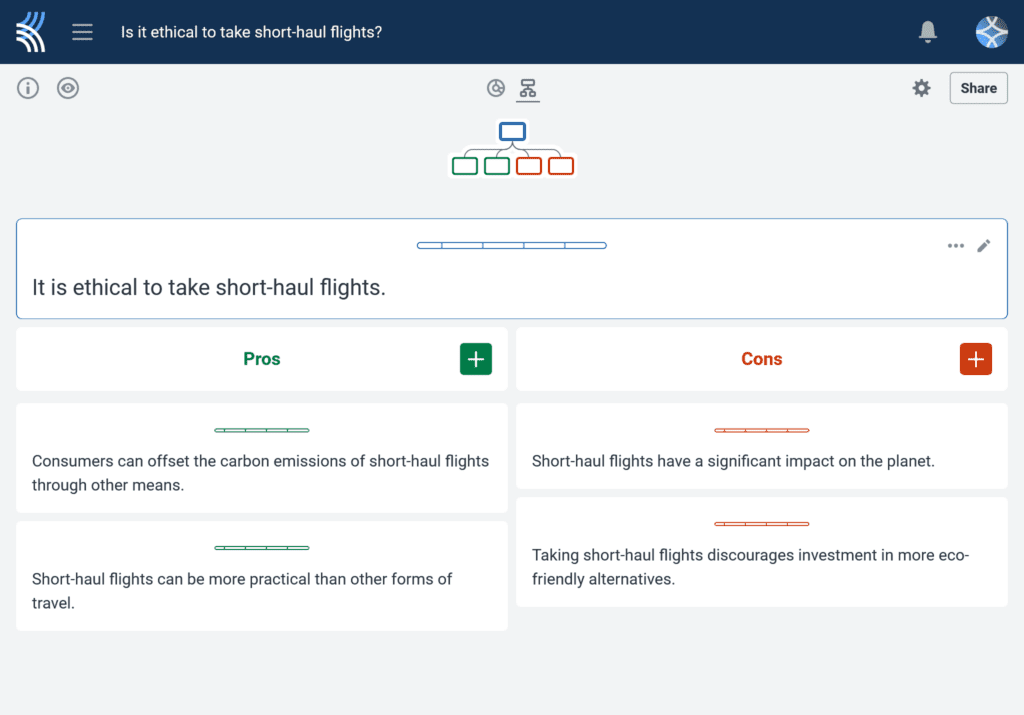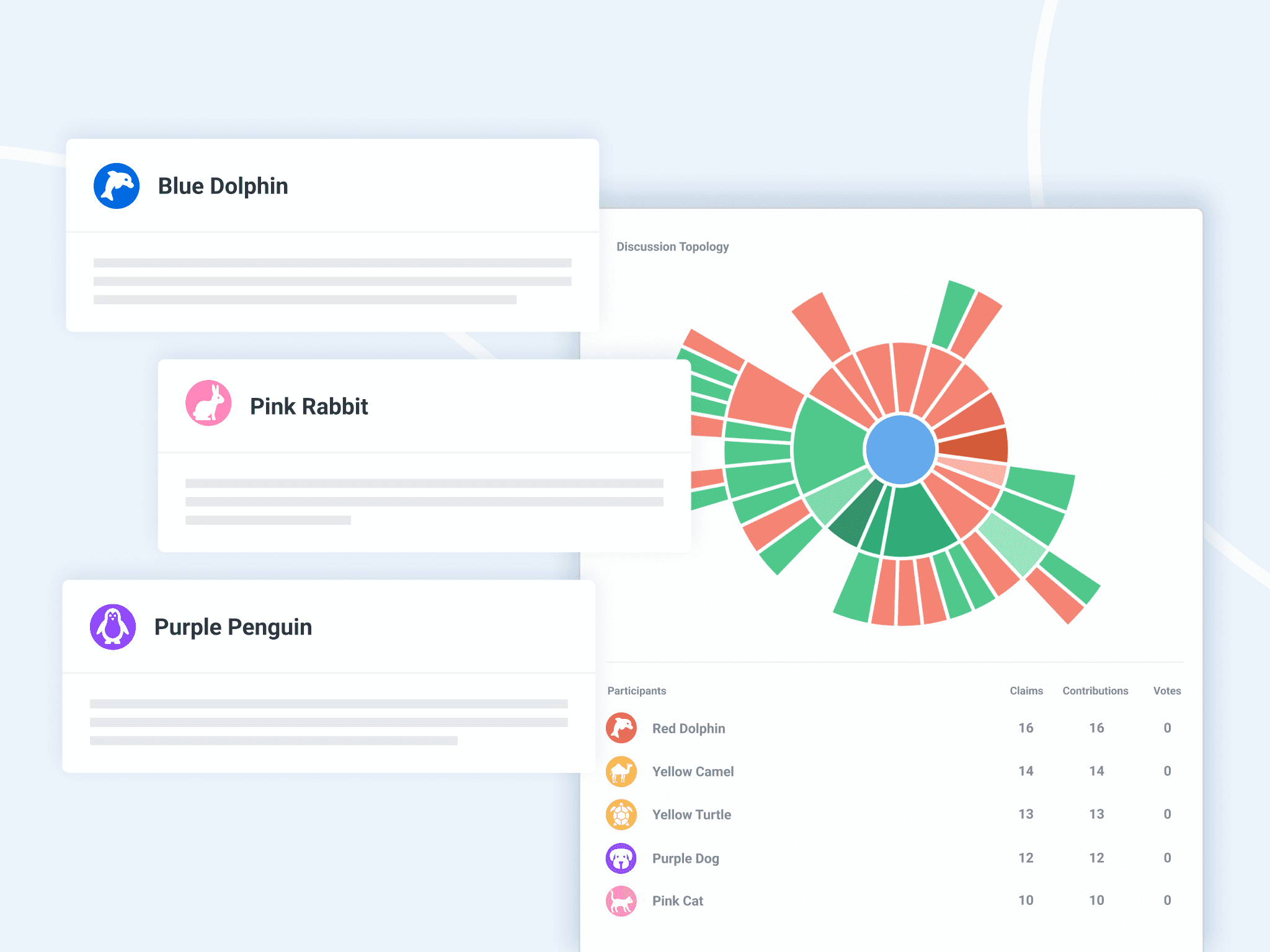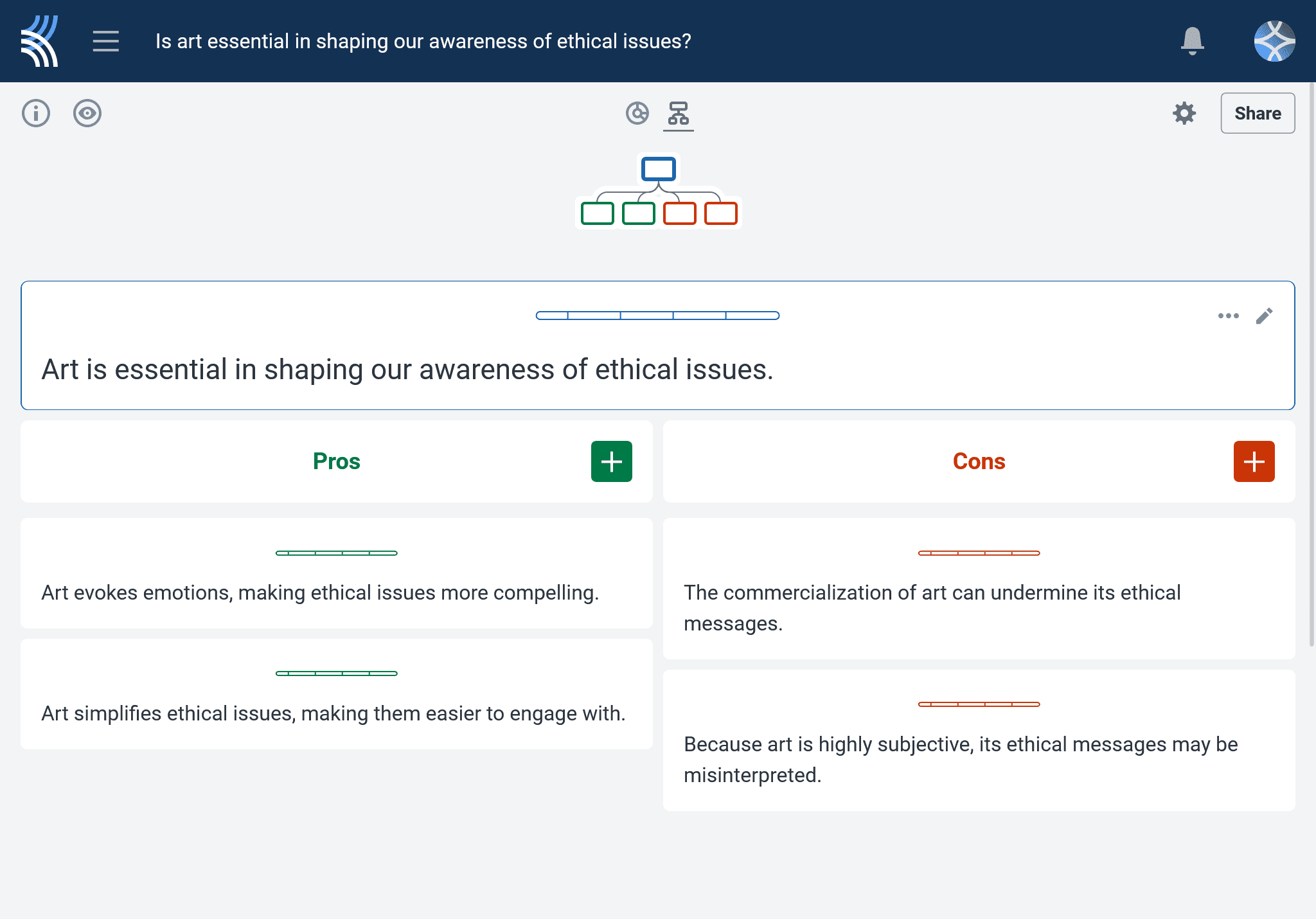Students encounter ethical questions in many aspects of their lives, from everyday decisions on social media to global issues like climate change.
In this article, we’ll explore how classroom discussions are a meaningful way to explore such questions, and demonstrate how Kialo — a free discussion tool — supports students in examining ethical questions with depth and clarity.
By guiding students to engage with these topics critically and thoughtfully, educators can help prepare them to navigate the ethical decisions they’re certain to face in the future.
Why discuss ethical questions with students?

Ethical questions don’t come with easy answers, which makes them great opportunities to challenge students to make reasoned judgments, articulate ideas, and refine their thinking when faced with alternative perspectives.
Similarly, reflecting on principles such as responsibility, justice, and fairness supports their growth into thoughtful, responsible decision-makers in an increasingly complex world.
Having regular class discussions can help prepare students to navigate real-world dilemmas, whether local or global. By engaging with ethical questions, students can build essential critical thinking skills to analyze today’s information landscape where online content can be emotionally charged, biased, or unreliable.
Strategies to discuss ethical questions with students
1. Introduce students to ethical frameworks for a structured approach to exploring ethical questions
Using an ethical framework gives students tools and techniques to navigate moral issues. This structured approach helps students use critical thinking to develop and define their own views.
Kialo’s unique visual format maps arguments, counterarguments, and supporting evidence. This structure helps students externalize their reasoning so they can better identify the relationship between claims, while educators can monitor student thought processes, not just conclusions.
2. Recognize sensitive topics to foster respectful and inclusive discussions
Ethical questions can stir strong opinions, shaped by diverse values and beliefs. Students may worry about offending peers or being judged for their opinions. That’s why it’s important to build a supportive environment where students feel safe participating.
In Kialo discussions, the focus is on examining ideas rather than on the individual behind them. The text-based format gives students space to reflect and respond thoughtfully. And, if your students are hesitant, Kialo’s optional Anonymous Participation allows them to participate with greater freedom and confidence!

3. Use real-world case studies to help students apply ethical reasoning
Ethical issues rarely support a single “right” answer, making them ideal for nuanced discussion. Grounding such ethical questions in authentic contexts helps students connect their ideas to tangible consequences and better understand the impact of real-world decision making, while also supporting cross-curricular goals.
Kialo’s multi-thesis option gives students a structured approach to exploring different solutions to real-world dilemmas. And by carrying out research to support their contributions, students can deepen the discussion and add credibility to their claims by adding sources such as newspaper articles, academic references, or expert opinions.
4. Encourage ethical reflection and perspective-taking

By discussing ethical questions, students learn to justify their position while reflecting on how it aligns with their personal values. To help develop greater ethical awareness and critical thinking skills, encourage them to ask thoughtful questions to identify underlying principles, assumptions, and potential consequences.
Kialo’s structured format presents and organizes competing arguments side-by-side, exposing students to opposing ideas in a non-confrontational way. Try using the sunburst view for a bird’s-eye view of the discussion to help students quickly identify arguments that haven’t been fully explored.
To help you jump into discussing ethical questions with students, use these ready-to-go Kialo discussion resources, complete with a thesis and a few claims to get the conversation going!
Ready-to-go activities for discussing ethical questions
1. Is it ethical to take short-haul flights?
Invite students to explore key questions in environmental ethics, weighing the trade-offs between sustainability and convenience. They’ll examine the balance between individual and collective responsibility, reflecting on their role as global citizens.
Expand on the discussion with these follow-up questions to help students further apply the principles discussed:
- Should governments ban short-haul flights where train alternatives exist?
- Is it ethical for celebrities and politicians to advocate for climate action while using private jets?
- Should individuals take personal responsibility for their carbon footprint?
2. Should history lessons include ethical judgments?
Invite students to consider the challenges of evaluating the past through today’s moral standards. They’ll reflect on the connection between historic injustices and current events, while weighing whether such moral evaluation belongs in history education.
Encourage ethical reflection after the discussion with these follow-up questions:
- Is it fair to judge historical figures by today’s moral standards?
- Should schools teach history as a neutral subject?
- Does avoiding ethical judgments about past injustices increase the risk of repeating the mistakes of the past?
3. Is it ever okay to lie?
This meaningful topic prompts students to reflect on honesty, and discuss when, if ever, deception is justified. It offers the opportunity to explore real-world cases in contexts such as social media content and politics, with students considering the impact and consequences of lying.
Help students explore the ideas raised by asking questions like:
- How do we distinguish between a harmless “white lie” and a lie that causes harm?
- If lying can prevent suffering, is it ethical?
- Is being “economical with the truth” the same as lying?”
4. Is war ever justifiable?
This challenging topic asks students to examine justifications for war, from stopping injustice to securing resources. They’ll consider the efficacy of non-violent alternatives and reflect on the long-term human and societal costs of war.
Help students dig deeper into the topic by asking:
- Does advancing technology make war more or less ethical?
- Who should decide whether a war is justified?
- Who is responsible for repairing the long-term damage wars leave behind?
5. Should we ever use force to create peace?
Have students explore the paradox of using force to obtain peace. Students might focus on areas such as proportionality in law enforcement or the balance between public safety and freedom of expression during protests. They might add a global lens, or analyze meaningful examples such as the right to self-defense.
To encourage further ethical reflection, students might consider questions like:
- Does peace achieved through force last?
- Who should decide when force is justified?
- Can violence be a moral necessity, or is it always ethically wrong?
6. Should we develop technology that can read minds?
Invite students to explore the potential of mind-reading technology, setting its real-world benefits against inevitable risks. By discussing whether or not such tools should be created, students will consider the balance between innovation and responsibility, and reflect on the values that guide technological development.
Help students go deeper in this discussion by posing questions like:
- Does the right to privacy include the right to keep our thoughts hidden?
- Who should have access to mind-reading technology?
- Would this technology place pressure on individuals to think a certain way?
7. Should morals be relative depending on culture?
This thought-provoking topic asks students to consider whether ideas of right and wrong are fixed or shaped by culture. As they consider respect for cultural differences and needs, they’ll reflect on the limits of moral relativism and whether a shared set of universal values can exist.
Encourage ethical reflection by asking students:
- Where do your moral values stem from?
- Are international rules fair if they’re based on one culture’s values?
- How might someone from another culture view some of your country’s shared moral standards?
8. Should the British Museum return artifacts to their countries of origin?
This discussion encourages students to think critically about the ownership of historical artifacts and the ethical responsibilities of institutions today. Covering key themes, including social justice, colonialism, and cultural heritage, students will weigh the value of shared global access to cultural treasures against the political implications of returning (or retaining) them.
To summarize the discussion, try these questions to encourage students to bring it all together:
- Do museums have a moral responsibility to return artifacts?
- Who owns cultural heritage?
- If articles risk being lost in their home country, should they still be returned?

